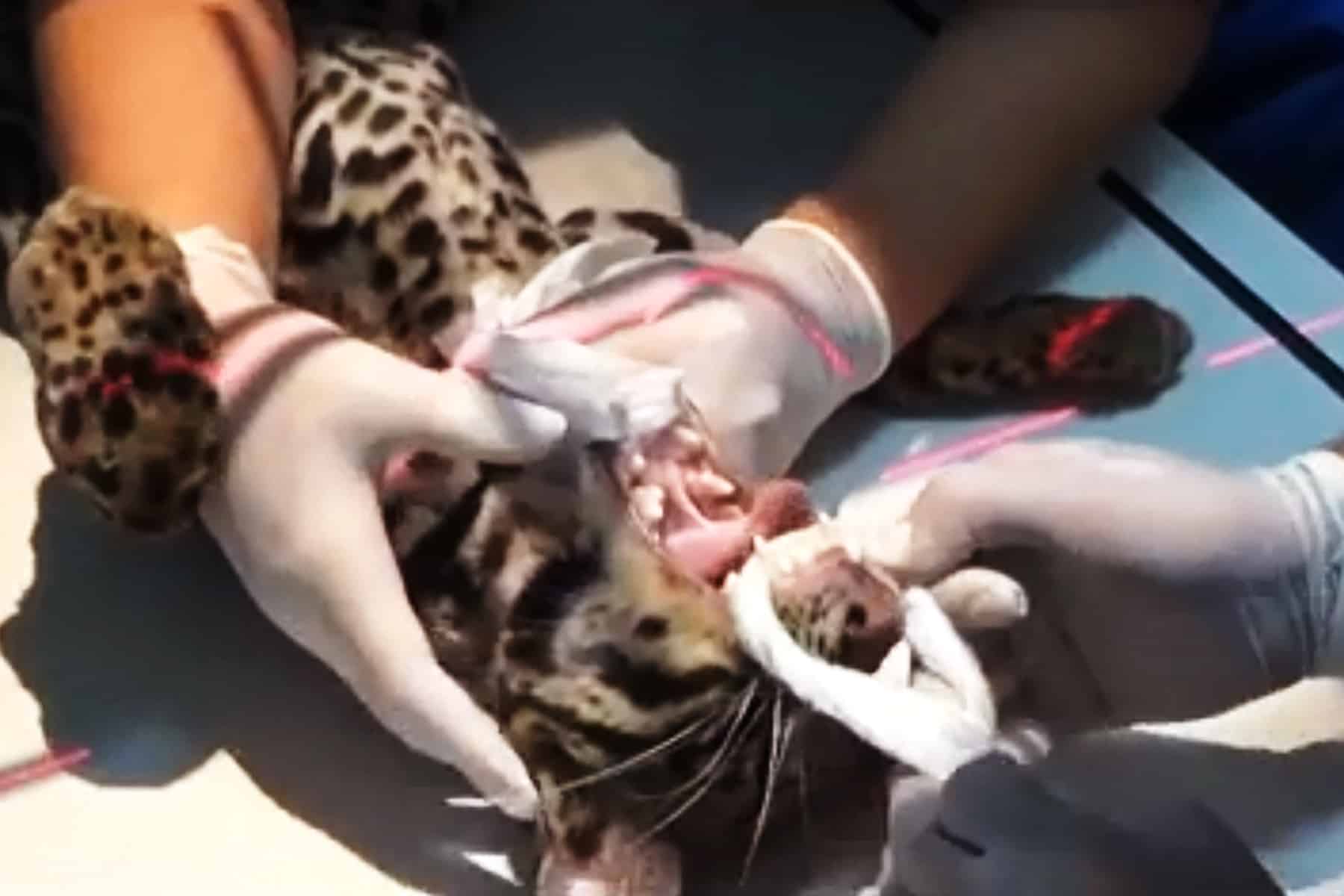An eight-month-old female ocelot will undergo urgent surgery on Wednesday to repair her broken jaw after being beaten, apparently, with a metal pipe.
The case highlights the continuing problem of animal abuse in Costa Rica, while a bill that would impose stricter penalties for abusers languishes in the legislature.
Environment Ministry (MINAE) officials discovered the ocelot earlier this month in San Juan de Mata, a community in the southwestern San José canton of Turrubares.
According to Adrián Arce Arias, MINAE’s wildlife conservation director for the Central Pacific Conservation Area, a family found the ocelot — a threatened species — inside their henhouse and allegedly beat her with a metal pipe, leaving her unconscious.
They then put her in a cage where she remained for several days without any care, food or water.
The small feline was spotted by National Police officers who saw the cage from the street and noticed the animal’s poor conditions during a rutine inspection of the neighborhood.
“Officers knocked at the house’s door and homeowners told them they had captured the animal the day before and that they were just about to call MINAE to help them remove her from their property,” Arce told The Tico Times.
The officers called the Refugio Herpetológico, a private-owned wildlife refuge in Santa Ana, west of San José, which took her in and has been taking care of her since. Refgue personnel even gave her a name: Alik.
The wildlife refuge’s resident biologist Rodolfo Vargas Leitón said vets conducted full physical examinations and blood tests on the ocelot. They also took x-rays because they noticed she was having trouble eating.
The results showed that her jaw was fractured and that she also had other wounds “consistent with injures inflicted with a metal object, like a metal pipe.”
In addition, she was severely malnourished, dehydrated, affected by parasites and higly stressed.
“We even had to remove nearly 300 ticks, and she had to undergo a very delicate process to stabilize her, as her general condition was very bad,” Vargas said.
While abuse continues, animal welfare bill at stalemate
Cases of animal cruelty in Costa Rica keep appearing on social media, but the country’s current laws don’t do much to discourage these acts.
Early on in his administration, President Luis Guillermo Solís promised to speed up the adoption of laws to protect animals. Specifically, bill 18,298 seeks to enforce prison sentences and high monetary fines for those responsible for harming or killing wild or domestic animals.
Last December Solís promised to prioritize the bill on the Legislative Assembly’s agenda. But discussions at the full Assembly have been delayed several times. Some lawmakers claim the current draft bill would unduly affect certain farming activities, and that parts of the bill may even be unconstitutional.
Legislators from the Broad Front Party, National Liberation Party and the ruling Citizen Action Party have filed motions against the bill, leaving its passage at a stalemate.
The government has carried out a series of public consultations with animal rights’ groups, who support the bill, and with sectors who believe the bill’s approval would hurt their business. The latter include cattle ranches, bullfight promoters, and organizers of horse parades and other animal-centered events that could be banned under the legislation.
Currently the proposal is under consultation at the Prosecutor’s Office, since some prosecutors expressed doubts earlier this year about the practical implications of prison sentences for some proposed crimes.
Refugio Herpetológico seeks help to pay for Alik’s surgery
Following the publication of Alik’s story on the refuge’s Facebook page, the organization has received several offers from veterinarians willing to perform the ocelot’s jaw repair surgery for free. But the refuge still needs $1,500 to pay for materials and post-surgery care.
The most expensive items are two titanium plates and nine titanium screws.
“We contacted various titanium component manufacturers and managed to get them at factory price,” Vargas said. On Tuesday evening the refuge reported that they reached an agreement with one of the manufacturers to get the titanium supplies on credit.
Refugio Herpetológico is asking people to help pay off the credit. Those interested in donating can do so through the refuge’s bank account (921387056) at BAC San José. An online form on the refuge’s website also allows donations through a PayPal account.
Call the refuge for further information at (506) 2282-4614.
See a video of Alik (Spanish only) posted by the Refugio Herpetológico:
https://www.facebook.com/video.php?v=10153258151794456






